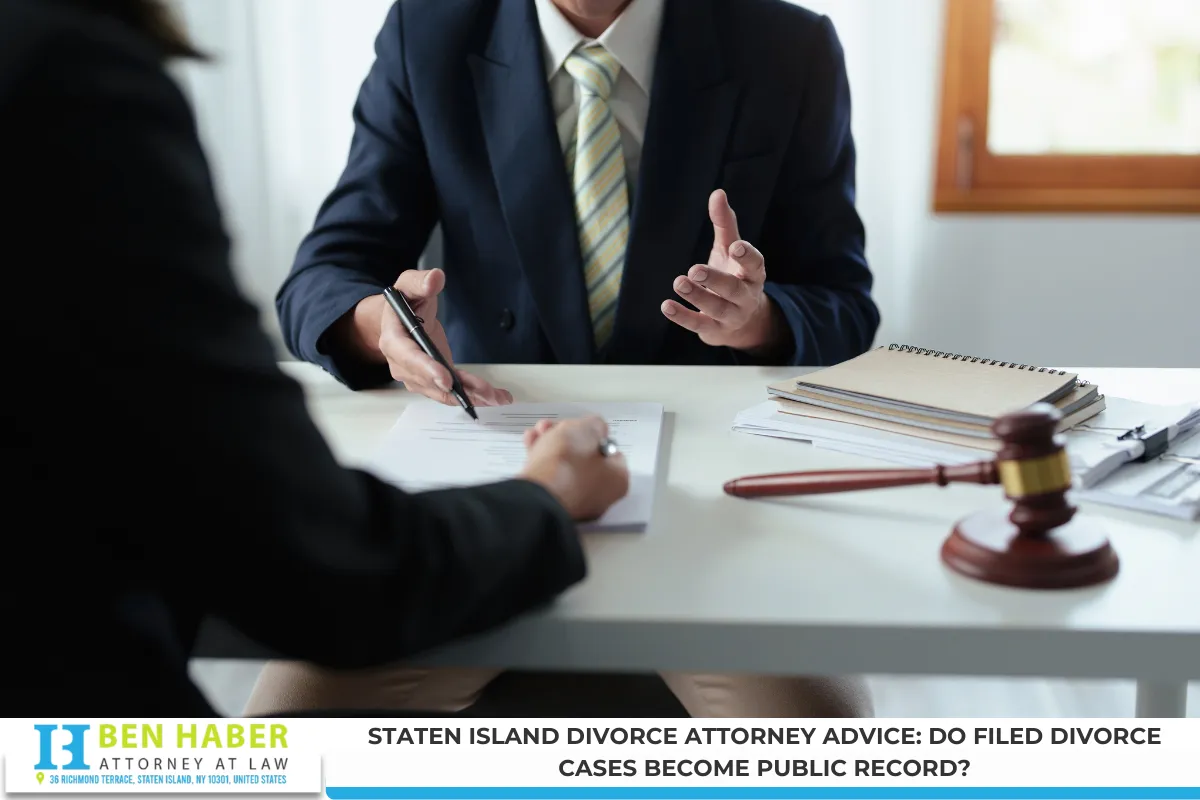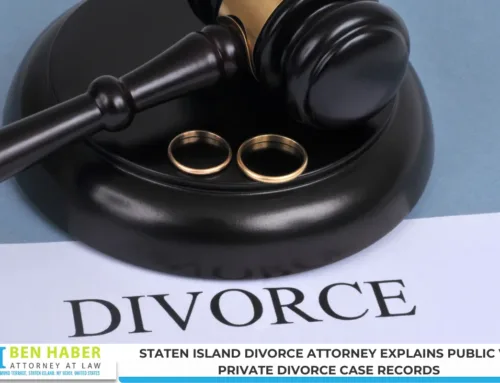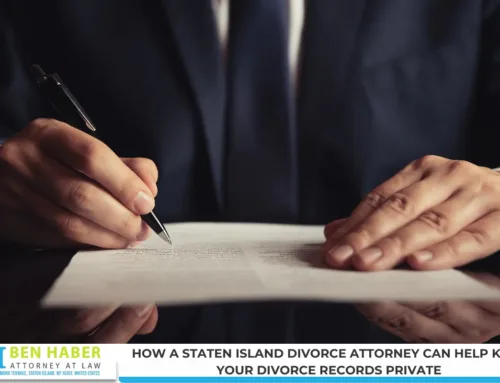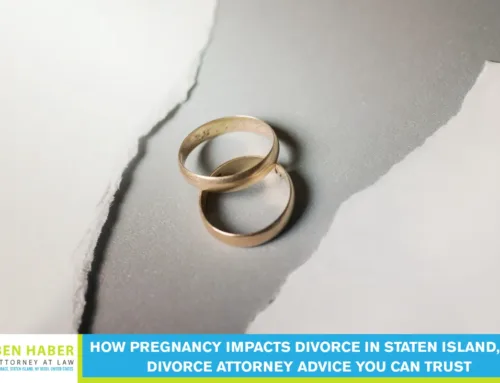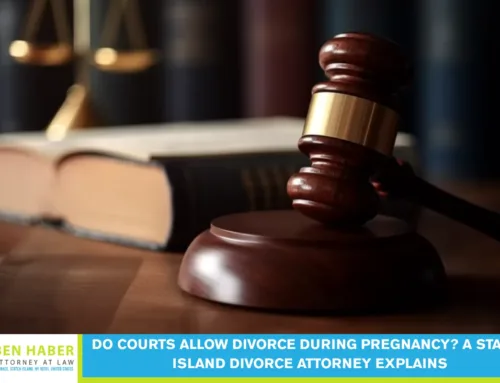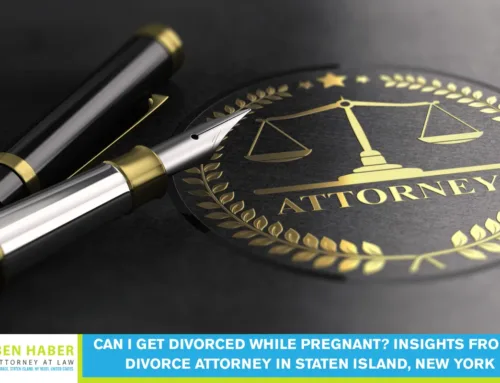The Hidden Truth About Divorce Records: What Staten Island Clients Need to Know
Considering divorce is never easy, and many clients wonder about privacy during the legal process. If you’re searching for a Staten Island divorce attorney, a major concern might be: “Will my filed divorce case become a public record?” This question weighs heavily on people’s minds, especially those with substantial assets or sensitive family law issues. The fear of private matters being exposed to the public can make a difficult time even more stressful.
But here’s the good news: In Staten Island and throughout New York, divorce records are not public documents. Most of your case will remain confidential, accessible only by the parties involved or their divorce lawyer. Understanding how this works—and what exceptions may exist—can help you approach your divorce with confidence, make informed decisions with certainty, and choose the right legal services for your unique needs.
Privacy and Divorce in Staten Island: What Does the Law Say?
When you file for divorce in Staten Island, your case is processed in either the Richmond County Supreme Court or Staten Island Family Court, depending on the nature of your case. New York law recognizes that divorce involves sensitive family law issues, so most records—especially those involving child custody, spousal support, and the division of marital property—are sealed from public view.
Divorce attorneys emphasize that divorce records in New York are confidential by default. The law restricts public access to all legal documents, background information, and court filings connected to your case, including the official Complaint, divorce decree, and agreements about child custody or support. Only parties directly involved—your family law attorney, your spouse, and certain court officers—have access to these files.
What Information Remains Private?
- Personal details about parties and children
- Assets/property division agreements
- Calculation of child support and spousal support details
- Domestic violence allegations or protective orders
- All agreements or disputes about custody goals, relocation, or scheduling vacations
The court recognizes the importance of confidentiality for families going through legal challenges and works hard to protect your privacy during every stage of the legal process.
Exceptions: When Divorce Information May Be Disclosed
While Staten Island divorce lawyers reassure clients that records are sealed, there are rare circumstances when limited information may be disclosed. For example, a judge might allow partial access for specific reasons:
- A party to the case or their attorney may request records
- Government agencies involved in family law issues (like child support enforcement)
- When a higher court orders disclosure in an appeal
- If there is a significant public interest, which is extremely rare in typical divorce issues
Even in these situations, sensitive details such as financial disclosures, evidence of domestic violence, and children’s names are protected. The public cannot simply look up divorce case files or read about the equitable distribution of marital assets and properties.
How Staten Island Family Lawyers Guide Clients on Confidentiality

Experienced family attorneys in Staten Island know that privacy is a top concern. That’s why most family law firms provide clear explanations during your initial consultation about how records are handled. Your divorce lawyer will explain:
- Client privilege: Communications with your legal expert are strictly confidential
- How legal documents are filed and stored in the court system
- What to expect during family court hearings
- Best practices for safeguarding personal information online or in collaborative law sessions
Clients often ask for an accurate estimate of what information might be seen by others. Skilled divorce attorneys help you understand which types of filings are confidential, which information may be included in the divorce decree, and how the legal process safeguards your privacy.
Uncontested vs. Contested Divorce: Does It Affect Privacy?
Clients may wonder if the type of divorce they pursue—uncontested or contested—impacts the privacy of their records.
Uncontested Divorce
In an uncontested divorce, both parties reach a complete agreement on issues like child custody, spousal support, and division of property. These cases usually move quickly and quietly through the legal process. Most uncontested divorce filings are sealed, and the public cannot view the background information or legal documents.
Contested Divorce
A contested divorce arises when there are disagreements about key family law challenges such as parental alienation, calculation of child support, or aspects of property division. Even in these cases, the court maintains the privacy of records. However, more documents may be filed due to ongoing disputes, so it’s important to work closely with your contested divorce attorney to ensure sensitive information remains protected.
Family law firms may use a divorce questionnaire to gather information, but this data is for legal use only and never made public. Both flat fee and hourly rate services include robust privacy protections.
Child Custody Disputes and Confidentiality in Family Court
When children are involved, privacy takes on added importance. Staten Island Family Court, like all family courts in New York, seals records related to child custody disputes, visitation schedules, and any claims of domestic violence. These records cannot be accessed by the public.
Special protections include:
- Sealed files for paternity issues
- Confidential records in parental alienation disputes
- Protection of children’s addresses and personal information
A skilled family lawyer ensures that your custody goals and any sensitive background information are discussed only with the court and the opposing party’s attorney.
Division of Property: What’s Private and What’s Not?
The division of property (also called equitable distribution) is often a key point in divorce. Clients with substantial property or retirement issues want to know if these details will be kept private.
In New York, marital assets and properties are divided fairly, not always equally, taking into account the disparity between spouses and tax considerations. Detailed information about substantial assets, business interests, and retirement accounts is included in sealed court records and cannot be accessed by the public.
Examples of what remains private:
- Lists of substantial assets
- Details of equitable distribution
- Legal advice from your divorce lawyer
- Negotiations about spousal support and marital property
- Sensitive documents used to value marital assets
Your attorney will also explain how to protect information during the legal process, especially if collaborative law or mediation is used.
The Divorce Filing Process: From Complaint to Decree

Understanding the step-by-step filing process can help you see where privacy is maintained:
- Initial Consultation: Meet with a family law attorney for legal advice and discuss background information.
- Divorce Questionnaire: Provide details about your marital issues, assets/property division, and child custody goals.
- Official Complaint: Your divorce lawyer files a legal document with Richmond County Supreme Court or Staten Island Family Court.
- Types of Filings: Whether it’s an uncontested divorce or a contested divorce matter, all court filings are sealed.
- Court Hearings: Discussions about legal practice area, family law issues, and custody disputes are private.
- Divorce Decree: Once the case is resolved, the judge issues a decree—this document is also confidential.
Clients should never worry that the details of their case, attorney fees, or the retainer quote will be shared with anyone outside the court and their family law firm.
Divorce Costs and Privacy: What’s Shared and What’s Not
It’s common for clients to ask about attorney fees, the retainer process, and whether details about the filing fee or additional fees are public. The answer: financial agreements with your legal expert—including flat fee or hourly rate arrangements—are strictly confidential.
Your family law attorney will give you a retainer quote and discuss the retainer fee in a private setting. None of this financial information is available to the public, and it is not filed with the court. The only costs that are paid to the court are standard filing fees, which do not include personal financial arrangements.
Protecting Your Reputation: Why Working With Skilled Divorce Attorneys Matters
Divorce can have long-lasting effects on your reputation, especially for those with business interests, substantial assets, or community ties in Staten Island and Richmond County. A family law firm with strong advocates on your side will:
- Advise on confidentiality in all aspects of your case
- Ensure your legal documents are prepared correctly and filed under seal
- Address all family law issues, including domestic violence and parental alienation
- Provide a clear strategy for contested divorces and division of property
- Offer person consultation or online appointments for added discretion
- Handle sensitive topics, from background information to substantial property, with care
The attorney-client relationship is built on trust and the guarantee of confidentiality, so you can move forward in the legal process with peace of mind.
Addressing Common Divorce Questions About Record Privacy

Can Anyone See My Divorce Papers in Staten Island?
No. Divorce papers and legal documents are not public record in Staten Island or anywhere in New York State. Only parties involved, their attorneys, and certain court personnel may access them.
What If I Need to Prove My Divorce for Legal Reasons?
If you need proof of divorce—for example, for remarriage or name change—your divorce lawyer can obtain a certified copy of your divorce decree. This is done privately through the court.
Will Child Custody or Support Details Be Kept Confidential?
Yes. All details regarding child custody, spousal support, and the calculation of child support are sealed. Court orders, agreements, and financial affidavits remain confidential.
Are There Any Circumstances Where Divorce Details Are Published?
No details are published for general public access. Rare exceptions may exist for appeals or specific government needs, but sensitive information is always protected.
Moving Forward With Confidence: Your Next Steps
Protecting your privacy is essential during any family law challenge. The first step is to schedule an initial consultation with a knowledgeable divorce attorney or family lawyer who can explain your rights and answer your questions. You’ll learn:
- How to keep your legal documents and background information confidential
- What the retainer process looks like and what the attorney fees will be
- How to safeguard details about marital property, child custody disputes, and other family law issues
- Which aspects of property division, spousal support, and child support will be discussed privately
- The role of your legal expert in protecting your privacy throughout the divorce process
Whether you’re facing an uncontested divorce, a complex contested divorce matter, or any other family law challenge, you deserve strong advocates who understand Staten Island’s legal system and can help you achieve the best outcome.
Staten Island Divorce Attorney — Benjamin Haber, Staten Island Divorce Lawyers

If you are facing a family law challenge in Staten Island or the surrounding areas, Benjamin Haber, Staten Island Divorce Lawyers, offers experienced, compassionate legal services tailored to your needs. As a trusted divorce attorney, Benjamin Haber guides clients through every step of the legal process, from uncontested divorce to complex contested divorce matters. Our team understands the importance of privacy and protects your personal information during child custody disputes, division of property, and spousal support negotiations. If you need a dedicated divorce lawyer who will fight for your rights, call (718) 442-0960 or fill out our easy contact form for a confidential initial consultation. Take the first step toward peace of mind—speak with an experienced family law attorney today.
Frequently Asked Questions About Staten Island Divorce Privacy and Process
1. Who can access my divorce records in Staten Island, and how are they protected?
In Staten Island, all divorce records—including petitions, judgments, and related legal documents—are sealed by law and protected from public access. Only the spouses, their attorneys, and authorized court staff can access these records. This confidentiality protects your sensitive information, including financial disclosures, custody agreements, and background information. If you require a copy of your divorce decree for official purposes, your divorce attorney can request one directly from the Richmond County Supreme Court. New York State prioritizes the privacy of all parties involved in family law matters, so you can move forward without worry about unwanted disclosure. This approach ensures a safe and respectful legal process for everyone involved.
2. What information about my finances and property remains confidential in a Staten Island divorce?
When you work with a Staten Island divorce lawyer, financial affidavits, property inventories, and settlement agreements are filed under seal. Information about marital property, assets/property division, retirement issues, and substantial assets is kept strictly confidential. Only court personnel and the parties’ attorneys have access. Even if your divorce involves substantial property or complex assets, these details are not accessible to the public. This confidentiality extends to spousal support, child support calculations, and any tax considerations related to equitable distribution. You can discuss all aspects of property division with your attorney knowing your financial matters remain protected throughout the legal process.
3. How do Staten Island courts handle child custody disputes and protect children’s privacy?
Staten Island Family Court and Richmond County Supreme Court place a high priority on the privacy of children involved in divorce cases. All child custody disputes, visitation schedules, and child support orders are sealed and not available for public review. The court may also use additional safeguards in sensitive cases, such as those involving allegations of domestic violence or parental alienation. Attorneys and judges work to shield children’s names, addresses, and identifying information. Only the parties, their legal representatives, and select court staff can access these records. This ensures that custody goals, relocation issues, and other family law challenges are handled with the utmost care for your family’s privacy.
4. Will my divorce costs and attorney fees be made public in Staten Island?
No, the details of your attorney fees, retainer fee, flat fee, or hourly rate arrangements are confidential between you and your divorce lawyer. These financial agreements are not included in public records or accessible to anyone outside the attorney-client relationship. Only the basic filing fee, required by the court, is a matter of standard procedure and does not reveal personal financial details. When you receive a retainer quote or discuss the retainer process with your family law firm, this information is protected by law and legal ethics. Clients can confidently pursue their case, knowing all aspects of the client relationship—including billing—are private.
5. What should I do if I need proof of my divorce for legal or personal reasons?
If you require proof of your divorce, such as a certified copy of your divorce decree, your divorce attorney can guide you through the request process. In Staten Island, you may obtain a certified copy from the court where your divorce was granted, typically the Richmond County Supreme Court. The process is private and your records remain sealed except for official use. Certified copies are necessary for name changes, remarriage, or other legal matters. Rest assured, even when you request these documents, only authorized individuals have access, and your sensitive information remains confidential in accordance with New York State law.
Disclaimer: The information provided in this article is for general informational purposes only and is not intended as legal advice. Laws and court procedures regarding divorce and family law can change and may vary based on individual circumstances.
Reading this article does not establish an attorney-client relationship. For legal advice about your specific situation in Staten Island or anywhere in New York, please consult directly with a qualified divorce attorney or family law attorney.
Read: Can I Get Divorced While Pregnant? Insights from a Divorce Attorney in Staten Island, New York

